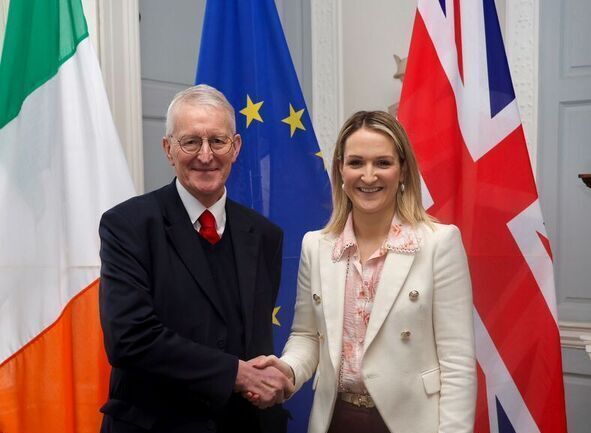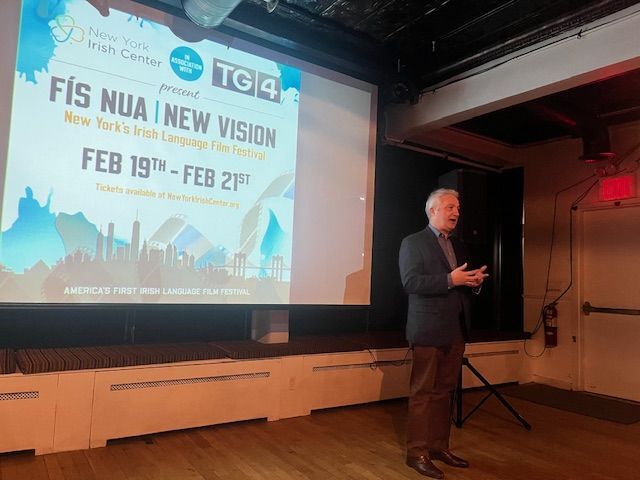The Good Friday Agreement is 25 years in existence today.
The landmark anniversary has already been marked by events in the U.S., led by a gathering last week at Cooper Union in Manhattan.
That event was attended by, among others, former president Bill Clinton.
And in the Washington Post today the 42nd President has penned an op-ed marking the anniversary of an agreement, the reaching of which resulted in significant part from the work of Clinton, his special envoy Senator George Mitchell, and his administration.
The anniversary today was also greeted by key supporters of the agreement in Congress, Senate Majority Leader Charles Schumer, and House members Richard Neal and Brendan Boyle.
And it comes on the eve of the visit to Ireland, North and South, by President Joe Biden, the current ultimate American guarantor of the GFA.
President Clinton, in his Post opinion piece, wrote in part: "Twenty-five years ago, British Prime Minister Tony Blair and Irish Taoiseach Bertie Ahern signed the Good Friday Agreement, achieving peace in Northern Ireland after three decades of sectarian violence known as the Troubles claimed more than 3,500 lives.
"The April 10, 1998, agreement, approved by 71 percent of voters in the North and 94 percent in the Irish Republic, was the result of years of painstaking negotiation between parties who had long seen each other as bitter enemies, a consequence of bombings, reprisals, discrimination in work and social life, constant anxiety and fear — all leaving a dark cloud hanging over their children’s collective future.
"For the first time, the largely Protestant unionist parties and the primarily Catholic nationalist parties now would renounce violence, share power and determine their future together.
"A generation on, the situation in Northern Ireland is far from perfect. Too little progress has been made in true integration between the two communities. Divided neighborhoods remain, and economic inequality persists. The uncertainty surrounding Brexit — which Northern Ireland voted against — has led to political paralysis and left the country without a standing government for more than a year.
"But against the odds, the peace has held and democracy has not lost its grip. The Windsor Framework, agreed on earlier this year by Britain and the European Union, offers the opportunity to maintain a growing Northern Ireland economy. And it embraces the Good Friday Agreement’s promise that peace would be strengthened by special relations between Northern Ireland and the Irish Republic while the North retains its place in the United Kingdom.
"Why has peace in Northern Ireland endured, when other efforts around the world remain stubbornly far from a resolution? I believe the answer lies in the way the peace was made.
"First, the process was driven by the people. They’d grown weary of the killing and the arbitrary tragedies of nonlethal political violence, and weary of the economic deprivation born of the divisions.
It was clear in the faces of the people I met on my visits there, of all backgrounds, that they were determined that the conflict must end. As Hillary has emphasized, the people, especially the women, were out in front of the politicians because they wanted their children and grandchildren to grow up outside the shadow of violence and hatred.
"The Good Friday Agreement negotiations were driven and maintained through the rough spots by the demand for peace. It has produced an entire generation in Northern Ireland that has grown up largely free from the horrors of sectarian violence, free to focus on solving problems and seizing opportunities.
"Second, the political leaders on all sides showed real courage in making sacrifices and compromises with their adversaries and committing to inclusivity, knowing perfectly well that they were putting their own political futures at risk. Trust was built slowly but surely through years of confidence-building measures, such as prisoner releases and cease-fires.
"Real credit belongs to the leaders including Bertie Ahern and Tony Blair; before them John Major, Albert Reynolds and John Bruton; and to John Hume, David Trimble, Gerry Adams and many others. Soon, even unionist leader Ian Paisley, who didn’t take part in the peace talks, joined in a functioning government with Sinn Fein’s Martin McGuinness. In so many other conflict areas, leaders have ultimately failed to take that final leap of faith.
"Third, the peace process was successful because the United States was deeply involved in a way that both sides came to see as positive. I believed America could and should play a role in the Northern Ireland peace process — not in spite of, but because of our “special relationship” with the United Kingdom, and because of the large Irish American community that cared deeply about their ancestral homeland.
"At the urging of the New York Irish community, when I ran for president in 1992, I said that if I were elected, I would take an active role in ending the conflict, beginning by appointing a special envoy.
"Some advisers warned that it would be a difficult commitment to keep — and at first it was, with deep divisions in Congress and my own administration. Beginning with a two-day visa for Sinn Fein leader Gerry Adams that allowed him to give a speech to an Irish American group but not to fundraise, the United States carefully established itself as an honest broker that enabled the deeply distrustful sides to communicate.
"Finally, the peace has held because the framework of the Good Friday Agreement has proved to be fair to all sides and better than any other deal that’s out there. The details, hammered out under the brilliant, patient but determined watch of special envoy George Mitchell, reflected the complex views of both communities, enabling them to trust the agreement to protect their myriad interests.
"The agreement committed the parties to majority rule with minority rights, respect for individual rights, civil rights and the rule of law, the prohibition of violence, and disarmament and demobilization of paramilitary groups. It also created a system of shared decision-making, shared economic benefits and special ties to the Republic of Ireland and the United Kingdom.
"Though power-sharing has at times yielded frustration and even gridlock, it has given each side the opportunity to make its concerns heard and work toward consensus. Even now, with Stormont, the legislature, sitting unused, the question is 'when' not 'if' the government will get back up and running. Even the most imperfect democracy is better than a return to violence."
Senator Schumer, in a statement, said: "From the days of supporting a visa for Gerry Adams to visit American and supercharge the nascent peace process, to the hard work by all parties in forging and finalizing the Good Friday Agreement – and the later Stormont Agreement – the situation in Northern Ireland has moved from tragedy and violence and hopelessness to stability and peace and the possibility of shared prosperity.
"The Good Friday Agreement is a monumental accomplishment, and a shining example of the best of American diplomacy, but it is also a vision and a framework not yet fully realized. Thus, Americans who love Ireland, and our government, as well as all parties in the North and the governments of the UK and the Republic, must recommit to fully implement the power sharing and self-government and legal protection of all peoples and traditions that is embedded in the GFA.
"This is why it is so vital that all parties respect and implement the will of the voters and that we soon see power-sharing and self-governing in full swing – this kind of governing based on equality and good faith and mutual respect made possible by the GFA."
Massachusetts Congressman Richard Neal, in his statement, said: “Twenty-five years ago, the governments of Ireland and the United Kingdom signed the Good Friday Agreement, marking the end of the longest period of conflict in Irish history.
"It happened because everyone involved acted together in good faith, with both parties giving up something to come to this agreement. The Republic of Ireland relinquished Articles 2 and 3 of its Constitution, and the United Kingdom gave up the Border. The world was a witness to these proceedings.
“I have no doubt that my ancestors, who instilled a deep and emotional connection to this country, would be proud of the Ireland we have today. A strong, prosperous, and confident Ireland has firmly found its place on the world stage and used its voice, as always, to stand up for the less fortunate.
“One of my first speeches on the floor of the House of Representatives condemned the use of rubber bullets in the North of Ireland. My own heritage compelled me to do what I could, but many of the people I represent in Springfield, Holyoke, and Pittsfield would tell the same story. It was that story, bolstered by Americans all over the country, who kept the fortune of Ireland close to their heart. This, above all else, encouraged and invigorated me to continue our fight for peace.
“Today, on this distinguished occasion, we must remember that the Good Friday Agreement can and should be used as a template for peace around the world. Two generations have now grown up not knowing the violence of the Troubles or living with a hard border. As a guarantor of the agreement, the US has the indispensable role of continuing to uphold the principles embodied in the peace accord, ensuring no return to a hard border.
"The gains of this agreement have brought peace to the island of Ireland for twenty-five years, and we must continue our work to protect and strengthen these gains for future generations to enjoy.”
Philadelphia Congressman Brendan Boyle, in his statement, said: “As we mark the 25th Anniversary of the signing of the Good Friday Agreement, we must first acknowledge the historic progress and success that Northern Ireland has experienced as a result of it.
"The Good Friday Agreement has nurtured a generation of people who know only peace as their world --and not the darkness and violence of the past that ripped families and neighborhoods apart. The agreement has also provided a shared foundation for peace that has allowed Ireland’s border communities to thrive and grow over the last quarter century.
“The United States supports this shared peace in our role as a guarantor, by law, of the Good Friday Agreement. Our elected leaders have shown in recent years, on a bipartisan basis, that we will not stand by idly and watch one of the world’s greatest foreign policy achievements weakened or destroyed. We will continue to work with all in Ireland who are committed to peace, equality, and justice.”









